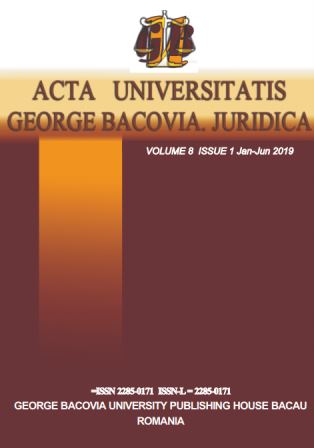Contractele judiciare, expresie a disponibilității procesuale în materie civilă
Juridical Contracts, an Expression of Trial Disposition in a Civil Context
Author(s): Gheorghe Durac, Naiana-Mihaela CĂRPUȘORSubject(s): Law, Constitution, Jurisprudence, Civil Law
Published by: Editura Universităţii George Bacovia din Bacău România
Keywords: the principle of disposition; civil lawsuits; subjective civil rights; legal protection; free will; juridical contracts;
Summary/Abstract: The notion of juridical contract should be analysed starting from the legal institution of trial disposition acts, which can have several meanings. In a broad sense, this legal institution refers to the manifestation of the will of the subjects of law, with the purpose of triggering a specific procedure in front of the court or to eliminate the obstacles that may hinder or stop the civil trial from the beginning, or with the purpose of avoiding an unfavourable situation for one of the parties. For instance, in order to trigger a specific procedure in front of the court, which only acknowledges the convention of the parties that express their consent in court, the latter verifying that the conditions and forms imposed by the law are complied with, for the respective convention to be closed in this context, and the subjects of law can express their intention to request the approval of an adoption or, in the case of spouses, they may, under certain conditions, ask a marriage annulment through their approval. These two special procedures are considered to be legal juridical contracts. A similar situation applies, by law, to the institution of sequestration or to the award order in forced public sales, both being classified as execution juridical contracts. In the same order of ideas, the parties of a civil trial may agree, in virtue of process disposition, in respect to the forms of trial, in order to insure the process of juridical activity, which would otherwise be followed or would evolve in different directions, possibly unfavourable to one of the parties or to other participants in the trial. Here are a few cases that may be classified in the category of juridical contracts, which concern the forms of trial: voluntary (conventional) prorogation of competence; voluntary (optional) joinder of parties; renunciation to exceptions or involving other procedural irregularities; principal voluntary intervention directly in the appeal; judging the reconventional demand or the request to introduce another party in the trial, together with the principal request, even made after the deadline foreseen by the law, but only with the agreement of the opposing party; formulating a request to insure the evidence, even if there is no urgency, if the opposing party agrees to it.
Journal: Acta Universitatis George Bacovia. Juridica
- Issue Year: VIII/2019
- Issue No: 1
- Page Range: 215-236
- Page Count: 22
- Language: English, Romanian

